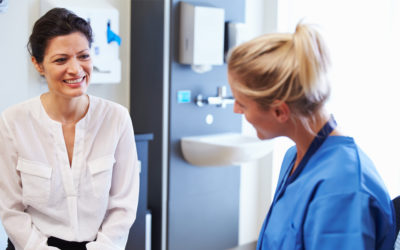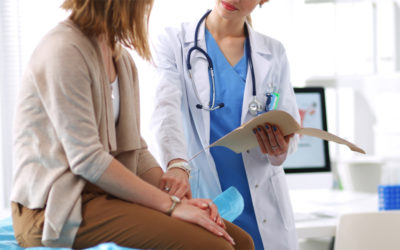Breast Health
Can Breast Cancer Risk be Controlled?
Scientists and doctors don’t know exactly what causes breast cancer, but they do know certain factors are linked to it. Some of these risk factors can be controlled and others cannot. So, while all women are considered at risk for the disease, experts at the American Cancer Society say that you may be able to lower your risk slightly by controlling the factors you can.
Risk Factors You Can Control
- Alcohol: If you consume one alcoholic drink a day, you are at a slightly increased risk for breast cancer. If you consume two to five alcoholic drinks a day, you are at 1 1/2 times the risk.
- Birth control pills: You are at a slightly higher risk of breast cancer if you are using birth control pills. If you stopped using the pills more than 10 years ago, you have no increased risk.
- Breastfeeding: Breastfeeding will slightly lower your breast cancer risk, especially if it lasts a total of two years.
- Weight: Following menopause, carrying excess weight can put you at a slightly higher risk for breast cancer. This is especially true if your extra weight is in the waist, and if you gained the weight in adulthood.
- Exercise: If you exercised as a youth, you may have a life-long reduced risk of breast cancer. If you exercise even a small amount as an adult, you lower your risk.
- Hormone replacement therapy: If you’ve used hormone replacement therapy for relief of menopause symptoms for more than five years, you’re at a slightly increased risk of breast cancer. If you stopped hormone replacement therapy five or more years ago, your risk is reduced.
Risk Factors You Cannot Control
- Age: Your chance of developing breast cancer goes up as you age.
- Family history: Your risk for breast cancer is higher if you have blood relatives who have had the disease.
- Genetic factors: If you have inherited a mutated gene from either parent, you are more likely to get breast cancer.
- Menstrual periods: If you began having your periods before the age of 12 or went through menopause after 55, you have a slightly increased risk of breast cancer. If you have not had children or had your first child after the age of 30, you are at a slightly increased risk.
- Personal history: If you have cancer in one breast, you have a greater chance of getting it in the other or in another part of the same breast.
- Race: If you are Caucasian, you are more likely to develop breast cancer than if you are African American. If you are Asian, Hispanic or American Indian, your risk is lower.
Signs and Symptoms
According to the American Cancer Society, the most common sign that you may have breast cancer is a new lump in your breast. The lump is more likely to be cancerous if it’s painless, hard, and has uneven edges, but some rare cancers are tender, soft and rounded.
Other signs of breast cancer include:
- A lump in your underarm area
- Swelling of part of your breast
- Skin irritation or dimpling
- Nipple discharge other than breast milk
- Nipple pain or your nipple turning inward
- Redness or scaliness of your nipple or breast skin
It’s important to have anything unusual checked by your doctor. If your doctor suspects that you have cancer, you’ll need more testing. If you are diagnosed with breast cancer, the American Cancer Society suggests that that you give yourself time to adequately learn about the disease and your treatment options.
Early Detection
Early detection is the best and most effective tool in the battle against breast cancer. According to the American Cancer Society, there are more than two million breast cancer survivors in the United States. Understanding your risk factors and making wise lifestyle choices is the first step. Regular check-ups and screenings are important, too – the earlier breast cancer is found, the better your chances for successful treatment and recovery. Mammograms play a key role in monitoring your breast health and detecting any changes that warrant further examination.
To schedule a screening mammogram, call 307-783-8196. A physician order is not required, but the patient must provide the physician’s name when an appointment is made. If the patient does not have a physician, a list will be provided for the patient’s selection. Your exam will be performed by a radiology technologist specially trained in mammography. All mammogram reports will be sent to their physician and follow-ups are the responsibility of the patient.
Schedule a Screening
Call 307-783-8196
Related Services and Conditions
Women’s Health
At Evanston Regional Hospital, we are dedicated to providing preventative, diagnostic and clinical services that support the health and wellness of women of all ages. We offer health screenings, breast health, childbirth and support services for women of all ages. The...
Colposcopy
Evanston Regionl Hospital offers annual well-woman exams, which include a routine Pap smear. Should the test show anything unusual, your doctor may recommend a colposcopy to get a closer look at the cervix. Colposcopy is a simple, virtually painless procedure, which...
Endometrial Ablation
If you suffer with heavy, painful and prolonged periods, the women’s health may be able to help. OB/GYNs at Evanston Regional Hospital specialize in endometrial ablation, an outpatient treatment that can significantly reduce or eliminate menstrual flow. About the...
Pelvic Prolapse
Pelvic floor disorders, including pelvic organ prolapse, affects 1 in 3 women in their lifetime. It impacts a group of muscles that keep the bladder, uterus, vagina, small bowel and rectum in place. Though it’s very common, many women are embarrassed to speak with...
Tubal Ligation
If you’re considering permanent birth control, talk to the women’s health team. OB/GYNs at Evanston Regional Hospital specialize in a safe and effective procedure called tubal ligation, also known as “having your tubes tied.” Tubal ligation is one of the most commonly...






